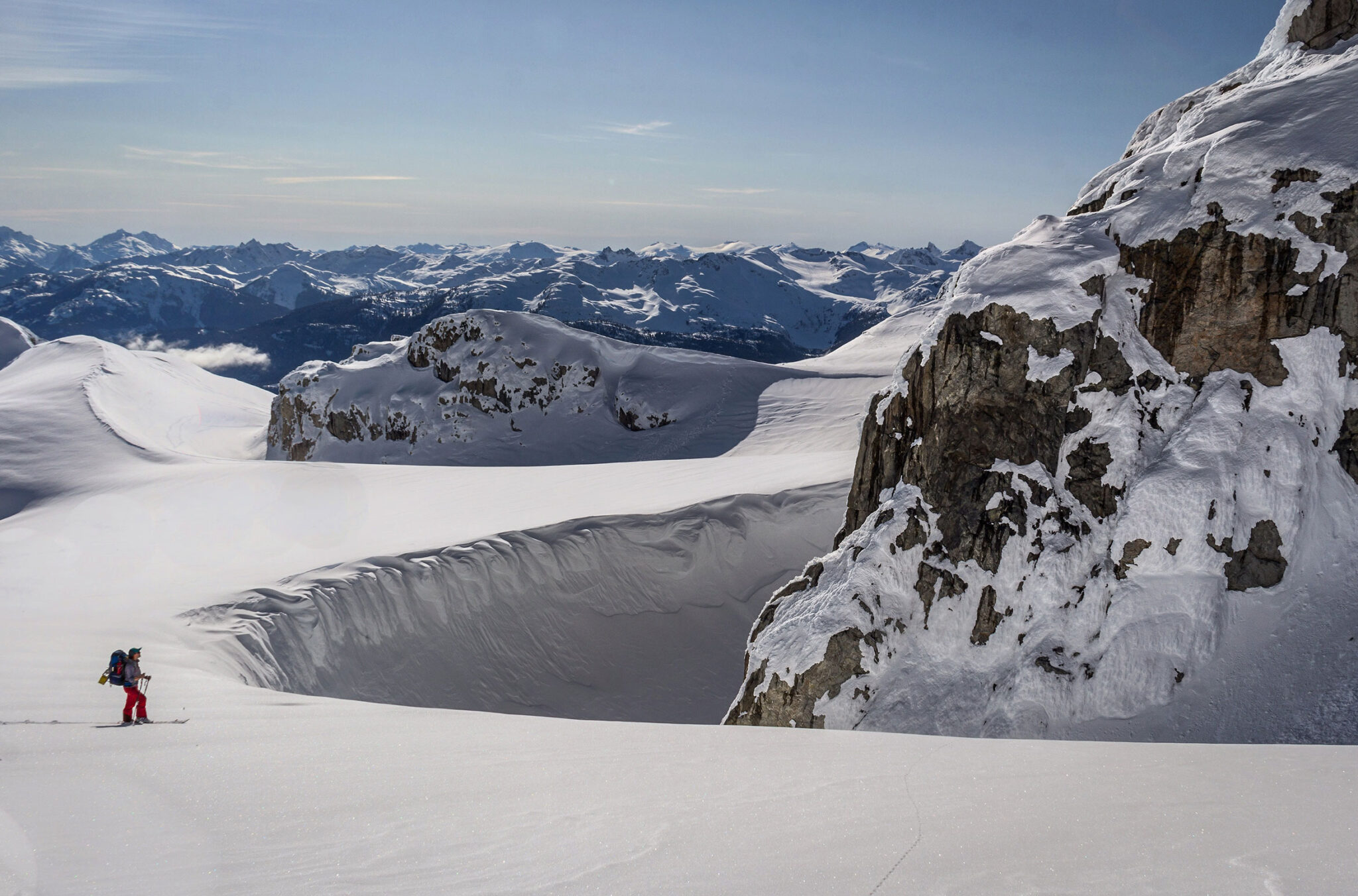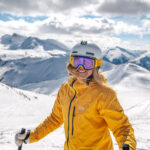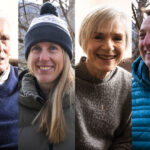HEADER PHOTO JORDAN UITTENBOGAARD
The Shifting Cultural Landscape of Whistler’s Outdoor Communities
For most people, playing in winter in Whistler involves some kind of sliding on snow. With 200+ runs over 8,100 acres of professionally patrolled and controlled terrain, Whistler Blackcomb boasts the largest ski area in North America. There’s something for all kinds of skiers and riders on these two mountains, but for some, the call of the backcountry is hard to ignore.
A growing number of snow enthusiasts are seeking out communion in the backcountry, taking on the extra effort (and risks) involved in order to experience a more meaningful connection to the land, and to each other. In the lead-up to International Women’s Day (celebrated on March 8), I spoke to four women working to make Whistler’s backcountry communities more inclusive, diverse and welcoming.
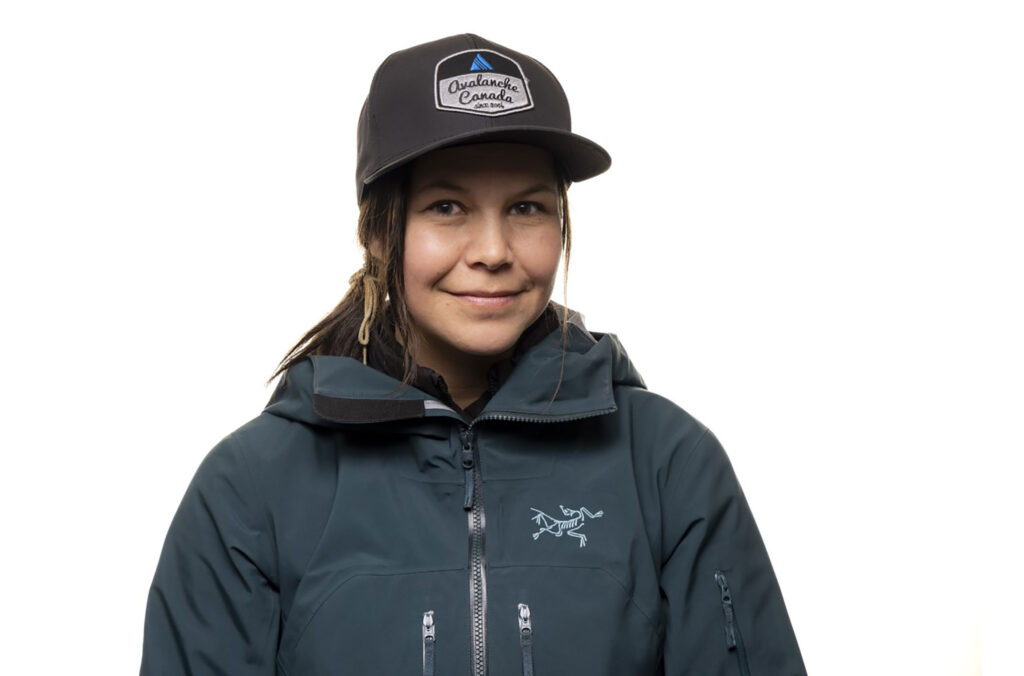
Sandy Ward, Backcountry Mentorship Co-Lead, Indigenous Women Outdoors
How would you describe splitboarding and backcountry skiing to someone who’s never done it before?
Well, you’re going to walk uphill in a massive sufferfest. But you’ll get to the top and you’re going to forget how much you suffered on the way up because the views are amazing, the company you’re with is hopefully amazing, the snacks along the way are great, the conversations can be ridiculous or super influential, and then you get to ski a fresh pow line, which is amazing. It’s all worth it.
How did you get into snowboarding?
Basically just growing up in the area. A lot of my friends were in Whistler, I didn’t spend too much time in Mount Currie (Ts̓zil) and on the reserve itself growing up, I was mainly in Pemberton and Whistler. All my friends were snowboarders so I wanted to try it out.
I got a job in Whistler Village at a coffee shop, saved up my first couple of paycheques and bought a snowboard and boots and bindings.
Did you have someone that you looked up to or who encouraged you for outdoor sports?
I joined the First Nations Snowboard Team after two years of snowboarding and that started my career in the industry. They supported me through my instructor certifications and then I was able to meet more Indigenous kids that were snowboarding. Learning about my culture through snowboarding, because of that team, was a really great experience.
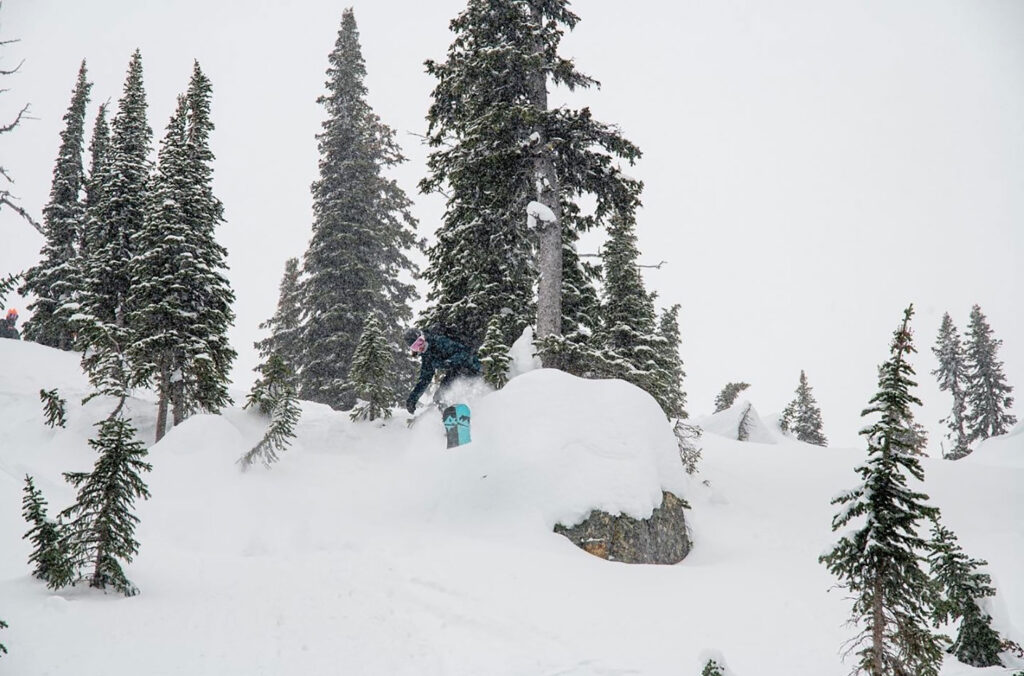
And then for the backcountry, my friend Marie-France Roy was the one that planted that seed of, “You should be a guide!” Having someone like Marie-France tell you that, you’re like, oh, she sees something in me because she’s super well known and she travels in the backcountry all the time.
What do you get from being out in the backcountry that you can’t get from other sports or experiences?
It’s more rewarding because you have to put the extra effort in to gain those skills and gain the knowledge to travel safely. Being an Indigenous person, being able to travel through our lands safely is something I guess wasn’t lost, but we became more reliant on settler knowledge to travel. I’m currently looking back at stories and seeing that our knowledge was just as true, and it was passed down through stories instead of books. It’s a different way of looking at the safety and knowledge that you need to get out there.
For example, there’s a story about the Glacier Traverse across the Lillooet Glacier that connects the Lil’wat Nation to the Sechelt Nation. It guides you through the terrain, giving an example of a peak and how you should stay south of it and how to mitigate the risk of falling into a crevasse. All of this information is in the story. I’ve mapped it out and been able to find the route over the glacier and looking at it, it’s actually probably the safest route across. This comes from hundreds and hundreds of years of knowledge of people doing that traverse and then telling their stories on the other side when they got back home.
Why do you think it’s important that more women experience the backcountry?
Traditionally, the whole ski industry has been really male-dominant. I think it’s a lot to do with women don’t see themselves represented, especially in the backcountry. Growing up, when I did my AST1, I had it fully in my head that I wanted to become a splitboard guide. A male guide told me that because I was a splitboarder, I wouldn’t be able to do it. So, right then and there I was stopped in my tracks, and that was ten years ago.
It took me this amount of time and seeing other women and other splitboarders in the industry, and now finally I’m able to go into this space and feel confident and comfortable. I was up at Whitecap Lodge three weeks ago and it was an all-female guide staff, which was absolutely amazing. I’ve never been in that scenario before and it was so powerful to be around that.
Have you witnessed any changes in the women that you guide and coach after connecting them with the backcountry and the skills that they need to be there?
Yes, especially with Indigenous Women Outdoors, the backcountry cohort. I’ve seen the women once they go through our program and they are so much more confident in all aspects of their life.
They’re so proud that they were able to travel in these remote areas and feel confident in the knowledge they gained in that time. You see them grow as women outside of the sport itself.
What advice would you give to anyone who’s considering moving into that space?
It’s all about the knowledge that you have to keep yourself and the people around you safe. Not just the people in your group, but the people out in the backcountry, the other groups out there. Taking those AST courses and hiring a guide is such a good way to get more knowledge and more insight into what the sport actually is. You need to be safe out there.
What are the things that you’re currently doing that you’re excited about?
I’m working on so many things right now. The whole Indigenous Women Outdoors backcountry program is kind of my baby. I’ve been running that thing since day one and to see it grow, to see the people come back to mentor the next year’s cohort, or become friends and join a community of Indigenous women that are able to go ski touring and splitboarding together, that’s the best part of my job.
And then also working with Indigenous Life Sport Academy with the youth. We’re creating a film that will be coming out next year and then the following year we’ll have it at the Whistler Film Festival. We’re showcasing two Lil’wat youths who are gaining the skills that they need to ride our sacred mountain, Ts̓zil.
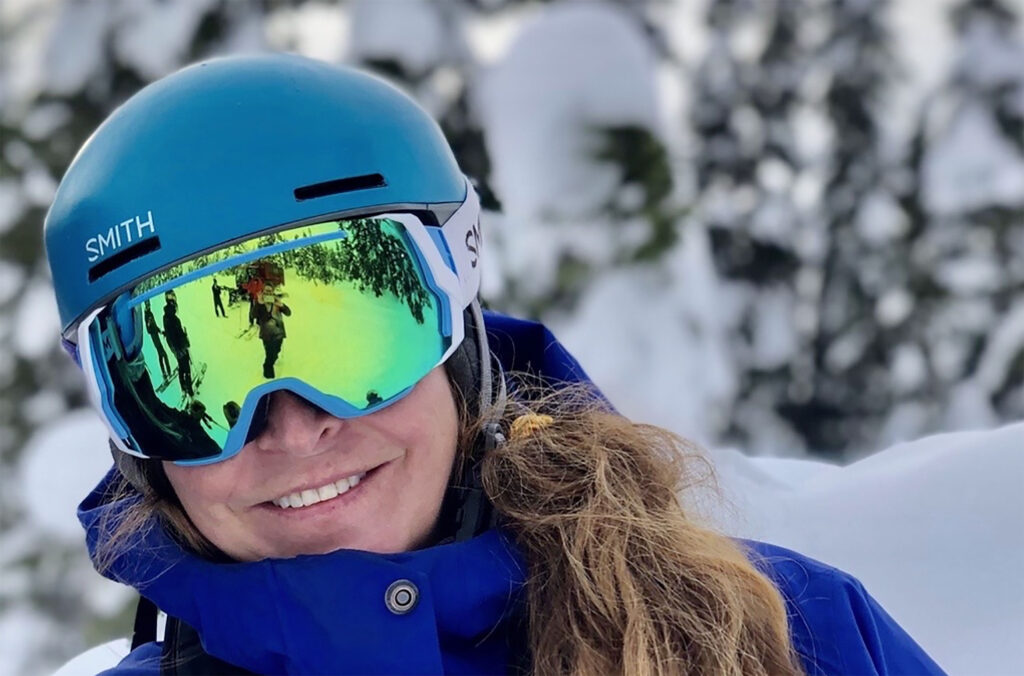
Jill Dunnigan, Owner and Operator, Extremely Canadian
What inspired you to start Extremely Canadian in Whistler?
I grew up in Nanaimo, but my uncles were early developers in Whistler. One of them built The Boot Pub and the other was heavily involved with Whistler Village’s early development. My parents would send me over to Rainbow Mountain with my grandparents and I would ride the rope tow with my brother while my grandparents sat inside the little lodge smoking cigarettes and drinking coffee.
I became a Whistler cliché and forgot to leave. I met my husband in Tommy Africa’s (now known as Après Après). He was a ski bum and we just kind of rolled into this Extremely Canadian stuff. I asked him in the beginning, how long are we going to do this for? He said, five years? Maybe? And now we’re coming up on thirty years.
Have you noticed any cultural changes in your industry during that time?
My management team is all female, which I didn’t do on purpose. I just hired the right people for the right job and it’s evolved into being all females right now, along with my husband Pete.
I’m looking for people that are really passionate about the mountains and guest service. Mostly what I appreciate about them is that they work so hard to take care of the team. In our world, if you take care of your staff, your staff show up happy, prepared and ready to put on a great experience for your guests. And they all love to shred.
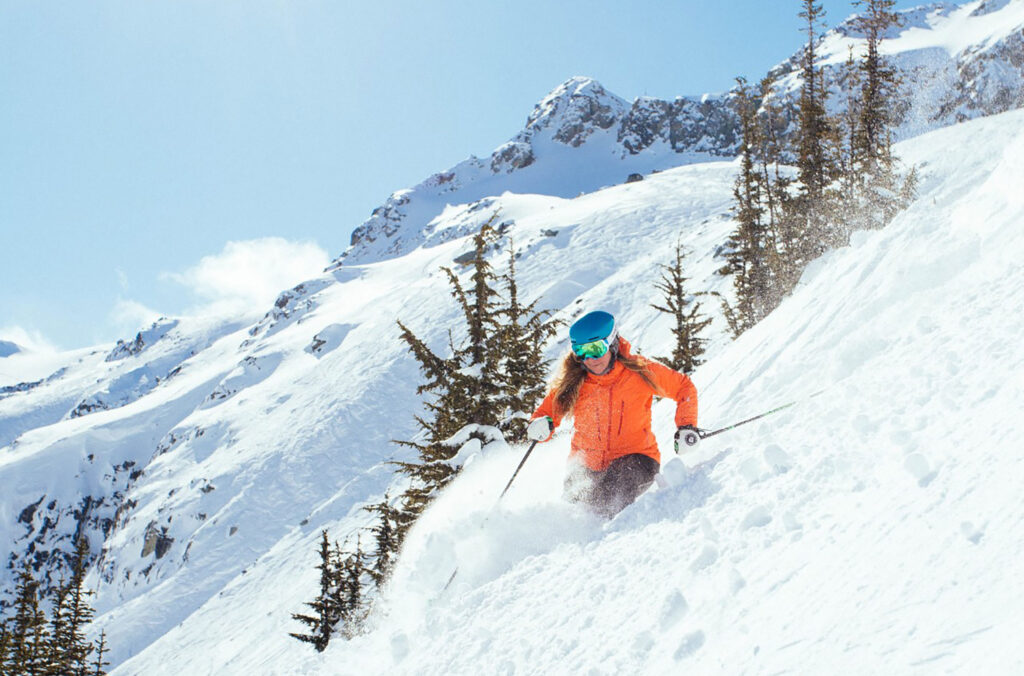
More recently, when we look at the resumes and someone is a splitboarder that’s kind of the dream. I look for that because I think that these people need support, and I do think that we can provide a supportive community for them to work and continue their professional development.
I didn’t give a lot of thought to it until probably the last three or four years, but we do provide a good work environment because we’re female-owned and operated, and also because my husband is a person of colour. The truth is it makes for a very open and safe workplace for people. We’ve never tolerated misogyny in the workplace, we try very hard to be inclusive, we try to be kind and mindful of each other.
We have noticed more diversity amongst our guests as well, which makes me really happy, and that really is recent, maybe in the last four years. These people can ski, and they’re here to enjoy the mountains, and it’s really great to see that it’s not just a sport for old, white guys.
Why do you think it was like that?
Part of me thinks that it did have to do with affluence; it’s an expensive sport.
Do you think having that diversity in the workplace allows people to be more vulnerable?
I lean heavier towards your intuition on things. Not so much vulnerability. It’s about being in tune and listening. When I’ve spoken to Sandy Ward about this, she talks about listening to the mountain and listening to your environment, and that’s something we talk about all the time in our workplace.
There was a day a few weeks ago, it was January 14, and the mountain was talking to us; it was a bad day out there. I literally contacted everybody on the team and said, if you want to call it a day, I’m happy to refund, because the mountain feels angry today and if you’re not feeling the vibe, just rain-check people and get home safe today. It was just one of those days and I think that having that intuition and listening to it, and feeling it, is what’s really important.
Can you tell me about the Rossignol We Rise Women’s ski / ride day?
It started as a Women’s Only day, but we have evolved it to an event that is for all women, non-binary folks, and gender non-conforming people. It’s an open and welcoming space for those who are comfortable in spaces that centre on the experiences of women; we just want people to enjoy skiing and snowboarding as much as we do!
View this post on Instagram
Abby Cooper, Creative Director Specializing in the Outdoor Industry
What drew you to snowboarding?
I grew up in the Rockies, Calgary area. My brother taught me how to snowboard when I was quite young. He’s nine years older than me and I thought he was the coolest. I never learned to ski, I only learned to snowboard. I was instantly hooked. It was a source of community for me, and every chance I got I would go snowboarding.
I vividly remember one time, I must’ve been like eleven or twelve, crying and telling my parents, you’re ruining my life! because they wouldn’t let me go snowboarding on a minus-45 day without the wind chill factored in. I just couldn’t comprehend anything worse than not going snowboarding.
How did you end up in Whistler?
I had been visiting for work and with different friend groups, and by the time I moved here I already felt like I was kind of part of the established community – such a rare treat for a newcomer. The Whistler community can feel quite layered sometimes, depending on how long you’re committed to staying here, and I feel really grateful that the backcountry community was really welcoming and open to anyone who was down to put in the work and connect.
Why is it important that more women experience the backcountry?
When I think of women in backcountry spaces and communities, being there, taking up more space and developing professionally, I get really excited. Growing up I started snowboarding and going in the backcountry when the only people I could go out with were my brother or my friend’s dads. I remember saving for avalanche gear when my girlfriends were saving for Ugg boots.
The backcountry has always been this really male dominant space and that’s how I’ve known it, but the community is evolving. I’ve seen the big push for women-only events, which I think create an awesome learning environment to connect and build friendships and skills. The more you know, the more confident you become in making good choices. If we all make good choices in the backcountry then it’s better for everyone because we all affect each other when we’re out there.
I do think there’s room for growth as far as getting more females into guiding programs, ski patrol and into creative spaces. At the same time, I want everyone to feel like they’re part of a supportive, educated, communicative community, regardless of gender.
I’ve been working with Incluskivity (pronounced inclu-SKI-vity) to help grow their program, which is for BIPOC and non-binary folk as well. We create this beautiful learning environment where they have a voice in the backcountry, no matter how they get out there and who they go with.
How would you describe being in the backcountry to someone who’s never done it before?
It means something different to everyone, and that’s what is so special about it. You can have your own relationship with the backcountry.
For some, it’s about epic summits and deep powder, and for others, it’s about the snacks. It can be a place for self-growth and a connective experience, or simply a social walk in the mountains with a little hit of adrenaline.
It’s so many things to me, it’s hard for me to talk about backcountry skiing or snowboarding because I feel like it’s not just something that I do as a passion, it’s also been my career for nineteen years. It’s honestly part of my identity, which is sometimes hard to separate myself from.
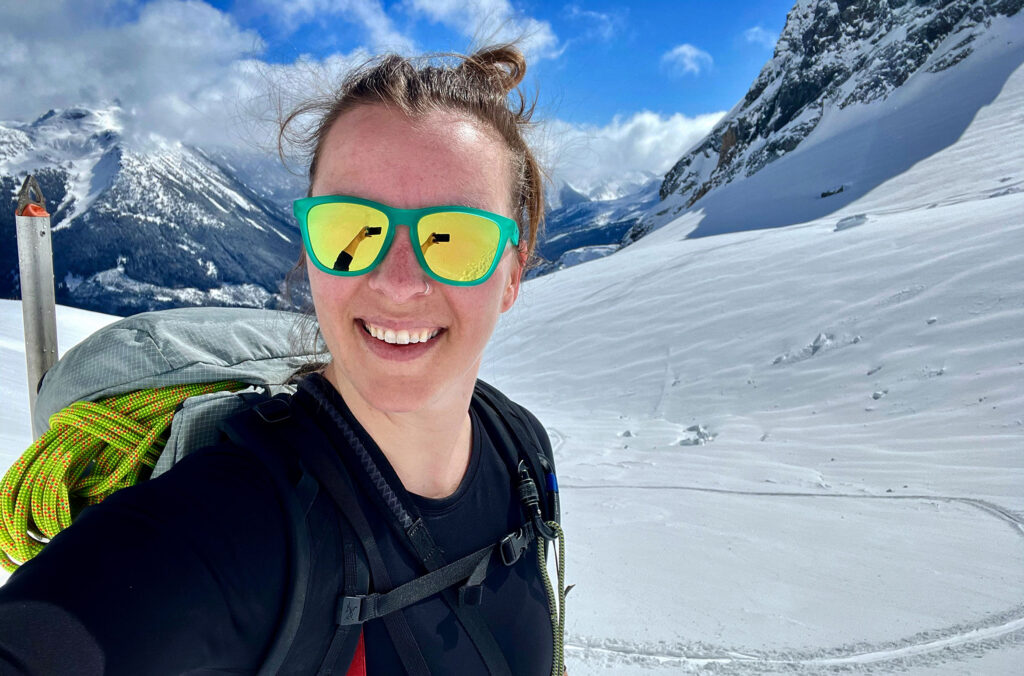
Ally Gandy, Vice President / Social Media & Communications Director / Mentor, Mountain Mentors
So how did you come to backcountry skiing?
I grew up in Toronto. I moved here when I was twenty-five, so I began venturing into the backcountry as an adult. I feel like I was catfished by the Sea to Sky. I was in Whistler on vacation one year, and a friend and her partner took us out to do some slack country skiing on a bluebird powder day, and that was it, I was just like, I have to move here.
I quit my job and lived on my uncle’s couch for a minute. I didn’t know anybody out here, so I had to work pretty hard to find a good community in the backcountry. That’s not super easy to do, so Mountain Mentors played a really big part in that when I ended up getting connected with them.
What is it about the backcountry that called to you so loudly?
There’s something so therapeutic about time spent in the mountains and finding that flow state where you can keep constantly moving all day; connecting with your friends in an incredible environment.
There’s a head-clearing process that happens every time you’re in the mountains and have to be a lot more mentally present. It’s so much more of a mental process than just putting skis on and going downhill. There’s very little similarity between the two, in my opinion.
When I started out in the backcountry I was much more about finding a cool line to ski, but the more time I spend out there, the more it becomes more of a holistic, all-encompassing purpose for why I’m out there.
Do you think the culture in the backcountry is changing?
When people are into peak-bagging or conquering the mountains, that’s always sat a little icky with me. I couldn’t put my finger on why, but after a few years of working with Mountain Mentors it’s much more obvious why that sort of culture bothers me. In my opinion, there’s so much more happening with respect to the land that we’re on and the environment that we’re in, that we should be bringing into focus and it’s not just such a self-centred lens as —
Man versus mountain?
Exactly. The ‘send it’ mentality, to just go after it. There are so many crucial things about being in the backcountry, and it’s amazing when all of those things line up, and you do have that day when you just get to the top of this unbelievable line and you can just have this sick moment for yourself down this crazy couloir.
But, I think what happens a lot of the time is that people backing off of things because it doesn’t feel right, or because somebody in the group isn’t comfortable, those things don’t get celebrated the way they should. That’s really what we should be celebrating, people making smart decisions and supporting each other and recreating in a way that’s encouraging and safe for everybody.
Any phrase that sounds something like, harden up or grow some balls or any of those really sort of antiquated phrases…
Yeah exactly, just comes straight out of that old culture. I think a lot of people are sort of unaware of the language they use and what impact it ends up having on people. Because while there’s nothing wrong with a good-natured ribbing of your friends, there is something wrong with that when people are sort of looking at that behaviour and thinking, am I supposed to be making decisions differently here? Do I not have a safe space to speak up about how I’m feeling about the situation we’re in?
Is it important for more women to experience the backcountry?
At Mountain Mentors we focus on women and marginalized genders, so that’s anybody who’s comfortable operating within an organization that centres the experience of women, but it doesn’t have to be just women, it could be non-binary folks, it could be two-spirit folks, it could be anyone who’s not male-identifying.
Have you witnessed any changes in the people that you guide or coach after connecting them with the backcountry and the skills they need to be there?
The number one thing that people end up with is the confidence to challenge things if they don’t feel right. I find a lot of the time all it takes is one person to speak up and then everyone’s like, yeah I was kind of feeling the same way.
When you’re able to help somebody find confidence in their voice; confidence in trusting their own gut, with decision making and picking backcountry partners carefully, confidence in speaking up to say, I didn’t love that experience, the number of people around that person who hear, see and watch what’s going on, that then think to themselves, it’s okay for me to have those same thoughts too, or to say the same thing, that’s change.
If you don’t see yourself represented in the backcountry it’s not as easy to say, hey I could do that, I could be out there, or I could be setting these sorts of goals for myself.
If you don’t see anybody that reminds you of you out there doing it, it’s a lot more challenging. The women I work with are all incredibly talented, driven individuals, and I’m sure they would have figured out how to make it happen, but I think it would take a lot longer to break down those barriers if they weren’t part of a program that aimed to take away some of those barriers for them. We’ve come a long way, but I feel like there’s a long way to go.
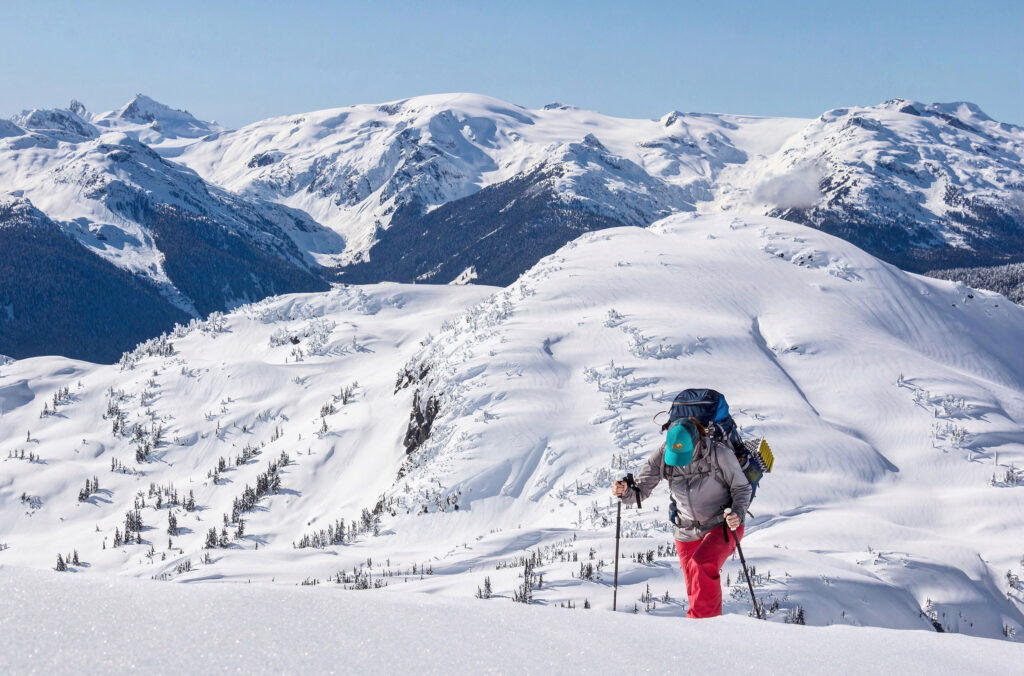
On March 8, International Women’s Day, I’ll be thinking about these stories, and how visible representation can be such a powerful tool for change. The more women there are in the backcountry, the more the culture changes; and the more the culture changes, the more space there is for everybody to feel safe, seen and heard.
If you’re intrigued about Whistler’s backcountry experiences including guided tours and courses, take a look at Whistler.com’s backcountry page as well as our blog posts on the subject. Stay safe.
Save up to 20% on lodging with Whistler.com this summer. Stay & Golf from $289 CAD per person, per night or Stay & Bike from $179 CAD per person, per night. Sign up to be a Rewards Member (for BC and WA residents only) and receive a FREE $50 CAD activity voucher on stays of 3+ nights.
You can also win a summer trip to Whistler with the Escape the Ordinary contest!
